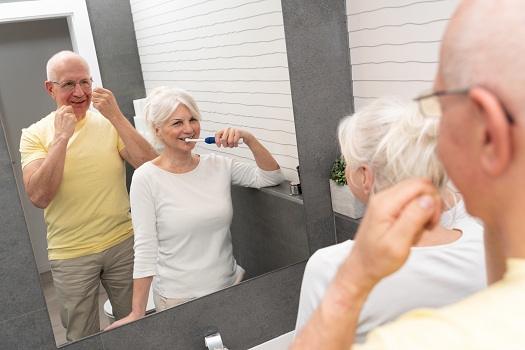Smile Bright: 6 Oral Health Tips for Older Adults

Maintaining good oral health is important at every stage of life, and as we age, it becomes even more crucial. Older adults are more susceptible to oral health issues due to factors such as medication use, medical conditions, and natural wear and tear on teeth. However, with proper care and attention, older adults can enjoy a healthy smile and prevent many dental problems. In this article, we will discuss six essential oral health tips specifically tailored for older adults.
- Brush and floss regularly: Regular brushing and flossing are the foundation of good oral hygiene. Brush your teeth at least twice a day using a soft-bristled toothbrush and fluoride toothpaste. Make sure to clean all surfaces of your teeth and gently brush along the gumline. Additionally, floss daily to remove plaque and food particles from between your teeth, which can help prevent gum disease.
- Be mindful of medication side effects: Many older adults take medications for various health conditions, and some medications can have side effects that affect oral health. Certain medications may cause dry mouth, which can increase the risk of tooth decay and gum disease. If you experience dry mouth as a side effect of your medication, talk to your doctor or dentist for potential solutions, such as using artificial saliva or adjusting your medication if possible.
- Stay hydrated: Drinking plenty of water is not only beneficial for your overall health but also for your oral health. Adequate hydration helps to maintain saliva production, which is essential for neutralizing acids and protecting your teeth from decay. Sip water throughout the day and avoid excessive consumption of sugary or acidic beverages, which can erode tooth enamel.
- Visit your dentist regularly: Regular dental check-ups are crucial for everyone, but especially for older adults. Dental professionals can identify potential issues early on, provide professional cleaning, and offer personalized advice on maintaining oral health. Schedule dental appointments every six months, or as recommended by your dentist, and communicate any concerns or changes in your oral health during these visits.
- Practice denture care: If you wear dentures, it’s essential to care for them properly. Remove and clean your dentures daily using a denture brush and mild cleanser. Avoid using hot water, as it can cause warping. Additionally, remember to clean your gums, tongue, and the roof of your mouth with a soft toothbrush or a damp cloth before reinserting your dentures. Regularly visit your dentist to ensure your dentures fit properly and make any necessary adjustments.
- Maintain a healthy lifestyle: Leading a healthy lifestyle can significantly impact your oral health. Eat a balanced diet rich in fruits, vegetables, whole grains, and lean proteins. Limit your intake of sugary snacks and beverages, as they contribute to tooth decay. Avoid tobacco products and limit alcohol consumption, as they can increase the risk of oral cancer and other oral health problems. Finally, exercise regularly and manage stress levels, as they can affect your immune system and overall well-being, including your oral health.
Taking care of your oral health is crucial as you age. By following these six oral health tips, including regular brushing and flossing, being mindful of medication side effects, staying hydrated, visiting your dentist regularly, practicing proper denture care, and maintaining a healthy lifestyle, you can maintain a healthy smile and enjoy good oral health in your golden years. Remember, it’s never too late to prioritize your oral health, so start implementing these tips today.
Picture Courtesy: Google/images are subject to copyright








